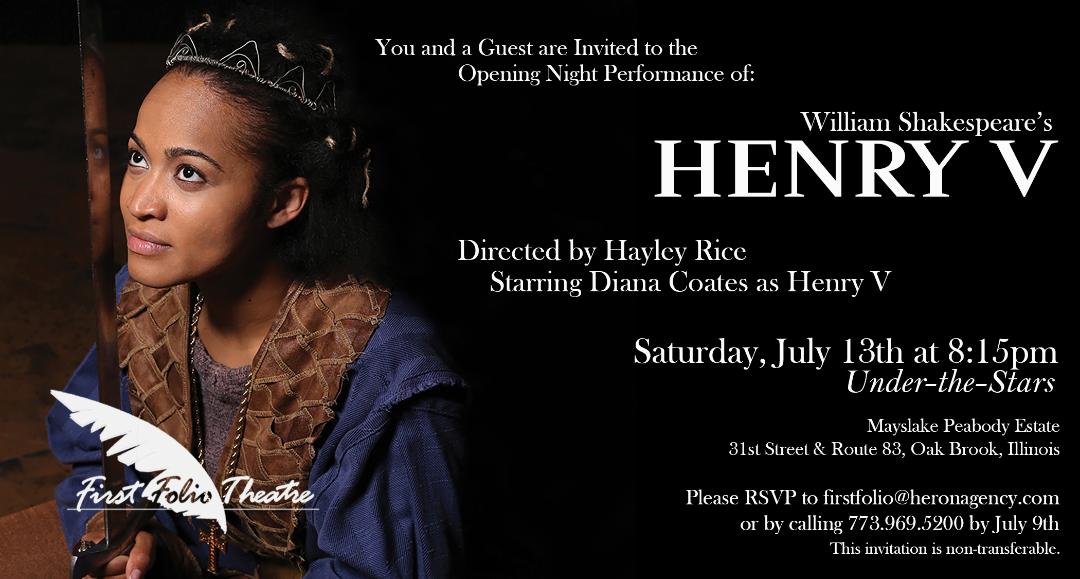
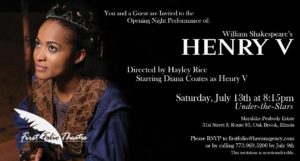 Recommended *** Opening night of First Folio Theatre’s “Shakespeare-Under-the-Stars” production of “Henry V” appropriately coincided with the eve of Bastille Day. Set against the background of the Hundred Years War, the story personifies the battle for supremacy between the English and French during the 14th and 15th centuries. It depicts one chapter of how English royal power advanced through a series of conflicts that sparked the establishment of Modern Europe.
Recommended *** Opening night of First Folio Theatre’s “Shakespeare-Under-the-Stars” production of “Henry V” appropriately coincided with the eve of Bastille Day. Set against the background of the Hundred Years War, the story personifies the battle for supremacy between the English and French during the 14th and 15th centuries. It depicts one chapter of how English royal power advanced through a series of conflicts that sparked the establishment of Modern Europe.
Boldly cast in the role of King Henry V is Diana Coates, an African-American woman, who plays the king convincingly and authoritatively. Her intensity is compelling; her ability to spellbind the audience is without equal. The heavens above us clearly felt the same way, as streaks of lightning surged in the distance whenever she took the stage at the beginning of the performance. As nearby storm clouds blew past us, these gave way to the moon and Jupiter, king of the planets, crossing the night sky together on a warm summer’s night. This celestial wonder was later pointed out by our audience’s contemporary tour guide a/k/a Chorus (Lydia Berger Gray) with an upsweeping motion of her arm.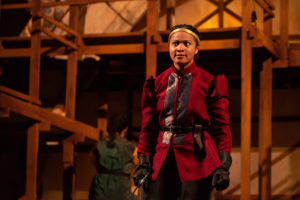
Multiple actors perform in more than one role. A standout is Sophie Scanlon who plays both Louis the Dauphin and Henry’s wife-to-be Katherine. Brilliant in her comedic use of the French accent, she portrays the Dauphin as tough, unyielding, and aggressive in sharp contrast to the sweet and demure Kate; a nod to the masculine and feminine archetypes of the era. Sean Sinitski, who plays both Pistol and the King of France, likewise provides a powerful discourse. Special mention needs to be made of Rachel Flesher, who skillfully choreographed the battle scenes (sans horses), and the director Hayley Rice, who oversaw the entire production.
The simplicity of the set spurs the audience’s imagination. It is simultaneously a castle, dormitory, throne room, sailing ship, tavern, campground, and the like. The color-coding of the costumes allows the audience to follow the action more easily, with the English noblemen wearing red, the French blue, and the Welsh green. Rascals and ragamuffins are dressed in muted tones. Various accents and dialects abound. As with all Shakespearean plays, the unfamiliarity of Middle English words and phrasing takes a moment to grow accustomed to.
The play ends with the Battle of Agincourt in 1415, where the English are outnumbered five to one, and yet they achieve a major victory. How could this have happened? Why does Henry’s side win? Was the English king a better or more spiritual human being than the French king? Is it that God listened to his prayer? Or is Henry simply more strategic in his “take no prisoners” declaration?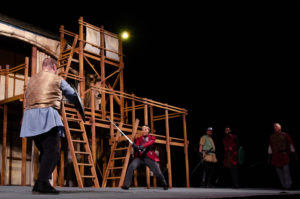
Perhaps part of the answer lies in King Henry’s good research and polling data (as we would call it today). The night before the fateful battle at Agincourt, he disguises himself as Harry LeRoy “a friend” and walks throughout the camp to learn of his soldiers’ true feelings about their king and their prospects for an English victory. By establishing that his troops are loyal to him and inspired to fight, King Henry ascertains that his chances for success in battle are indeed very good. One of the take-aways of “Henry V” is that victory has less to do with the number of people enlisted for a cause but, rather, how strongly motivated they are to succeed. In the end, it is the king’s charisma and his inspiring and fiery speech that stirs up the troops. King Henry knew that wars create bonds among soldiers. As he says: “We few, we happy few, we band of brothers; For he to-day that sheds his blood with me; Shall be my brother.”
This begs the question of what makes a great leader. Is it his ability to win at war with the fewest number of casualties? As Williams (Arielle Leverett) says, “Now, if these men do not die well, it will be a black matter for the king that led them to it.” Perhaps successful leadership has more to do with furthering diplomacy, such as merging two nations peaceably by wooing and wedding a rival king’s daughter. Or maybe it is all tied up with the ruthless ability to stave off treachery—and having the acumen to distinguish between the guilt of the misled versus the gilt inside a traitor’s purse.
I wasn’t sure at first what to make of the role of the contemporary American tourists viewing the physical remnants of castles and villages, ramparts and fortifications, and towers and turrets. That said, this is often how a modern audience can best relate to history. The dry and dusty tomes with their dates, facts, and figures are today ceded to vivacious tour guides who describe how territories rapidly flipped back and forth during the Hundred Years War. “One day, you were English; the next day you were French.” “The Bastille was originally built as a fortification against the English during the Hundred Years War and later became a prison.” So on and so forth….
The most significant moment of the performance, however, occurs when the very same actors who are the soldiers, nobles, and ruffians of 600 years ago transform into the tourists who travel to Europe today. A quick costume change thus represents a major shift in perspective. In the previous context, the same identical people are warlike; but now suddenly, all are at peace in the relatively prosperous economy of today’s European Union. Americans who have the means and the desire to travel abroad are thus in a good position to witness other cultures and customs and learn of the origins of once-brutish and hostile states engaged in conquest. The wars that stirred the Plantagenet lineage seem so far away and buried in the past; yet without them, our cultural heritage would not be the same.
With the ominous clouds and the thunder and lightning in the distance, many in the audience wondered: “Is the radar correct? Will it not rain?” I too considered this possibility and asked myself, “In which direction are the winds going to blow next?” As the evening progressed, this question seemed to relate more to the political winds than the climatic ones. To answer this, I quote from the immortal bard in the words of King Henry V: “Every subject’s duty is the king’s; but every subject’s soul is his own.”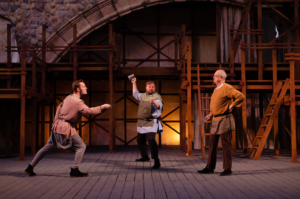
First Folio Theatre’s production of “Henry V” is playing outdoors from July 10 to August 18, 2019, beginning at 8:15 p.m., at the Mayslake Peabody Estate, 1717 31st Street, in Oak Brook, just west of Illinois Route 83. This is the last season on the original stage, which is being rebuilt in its entirety. After a hiatus in 2020, future outdoor performances are scheduled beginning in the summer of 2021.
Regular priced tickets are $34 on Wednesdays and Thursdays (seniors and students are $29), and $44 on Fridays through Sundays (seniors and students are $39). Special $10 tickets are available for children 14 and under. Tickets are on sale now and may be purchased by calling the box office at 630-986-8067 or online at www.firstfolio.org.![]()
First Folio is easily accessible via the East-West Tollway (I-88) or the Stevenson Expressway (I-55). Free parking is available on the grounds. Audiences are welcome to bring lawn chairs or picnic blankets or to rent them on site. A pre-purchased boxed supper is available and must be ordered at least 48 hours in advance.
To see what others are saying, visit www.theatreinchicago.com, go to Review Round-Up and click at “Henry V”.



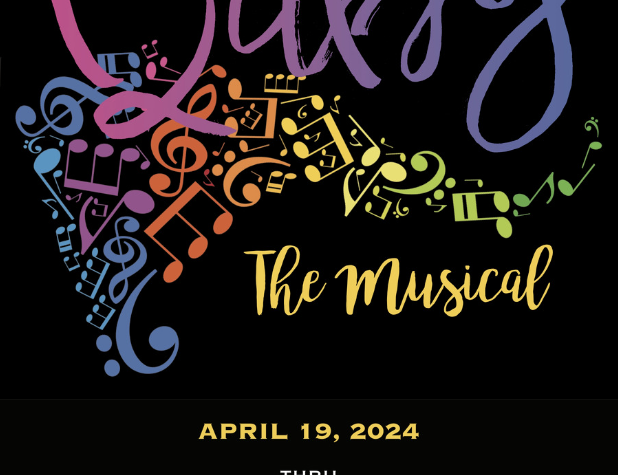
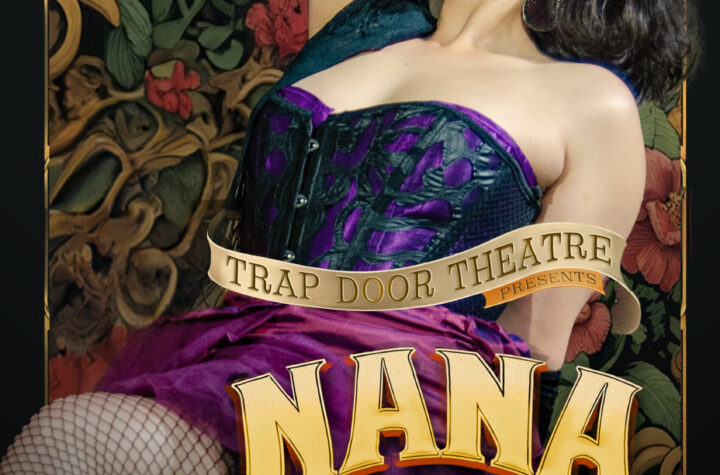

More Stories
“How to Know the Wild Flowers: A Map” reviewed by Julia W. Rath
“Baby: the Musical”
“Nana” reviewed by Jacob Davis